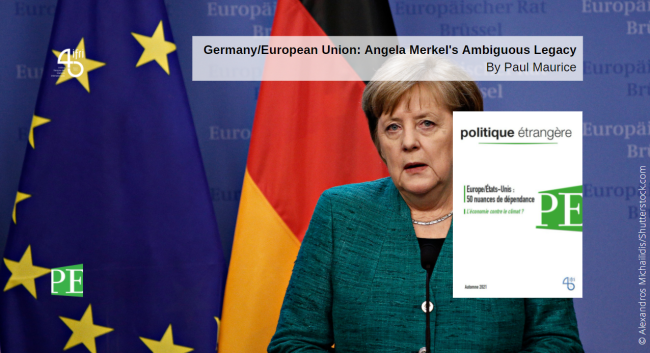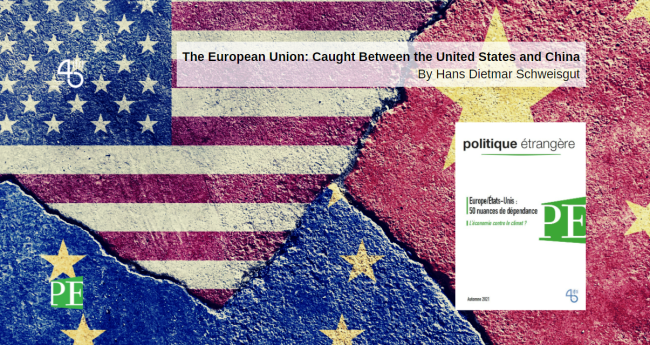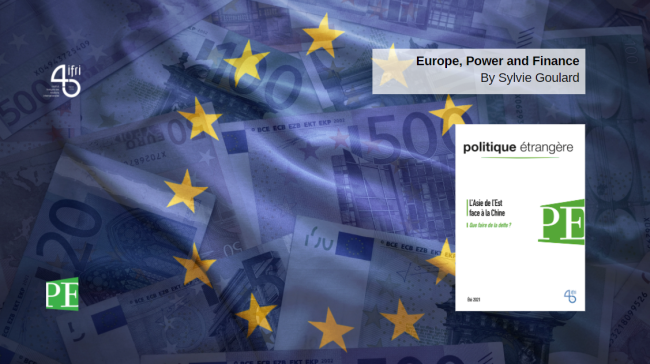Germany/European Union: Angela Merkel’s Ambiguous Legacy
Angela Merkel is ending her fourth term as German Chancellor. Although she has made a number of statements demonstrating her commitment to the European project, her record in this area nevertheless appears to be mixed.
The European Union: Caught Between the United States and China
The United States and the European Union (EU) are now both in agreement regarding China – long viewed benevolently – as a systemic rival in the international order.
The Changing Landscape of European Cloud Computing: Gaia-X, the French National Strategy, and EU Plans
Non-European cloud service providers host the vast majority of European data, which is viewed as an economic as well as a political problem. Gaia-X, European governments and the European Union aim to bolster the European cloud market while responding to data privacy and cybersecurity concerns.
Towards Geopolitical German Development Cooperation? Recent History, Current Trends, and Future Prospects
German development cooperation (GDC) in a post-Merkel era can be expected to become more geopolitical. Recently adopted German policy documents like the Indo-Pacific guidelines as well as the support to the geopolitical ambition of the European Commission suggest such a tendency for future German policy making.
Europe, Power and Finance
Finance has become an essential attribute of power. Its importance has grown given the substantial investments needed for the energy and digital transitions as well as the need to support economies affected by the COVID-19 pandemic.
USA/Europe: Seven Digital Challenges
As a consequence of the positive momentum in Transatlantic relations brought about by the arrival of the Biden administration, significant progress is expected on a range of key digital issues.
The German Presidency of the EU Council 2020. What Role for Paris and Berlin?
The German EU presidency in the second half of 2020 was Angela Merkel’s last presidency, shortly before her chancellorship ends in 2021. It was therefore expected that the Chancellor would use all her experience and influence to achieve positive results.
A “Coronavirus Presidency”: The Consequences of the Health Crisis for the German Presidency of the Council of the EU
On July 1, 2020, Germany assumed the six-month EU Council Presidency, at a time of global pandemic crisis. This presidency has thus quickly become a “corona presidency” in its objectives and functioning, itself a victim of the pandemic.
European asylum and immigration policy: what role for the Franco-German couple?
EU policy on migration and asylum is being built for the last 20 years. But this process is today on hold although France and Germany support the same position on this matter. However, the “migration crisis” in 2015 highlighted the weakness of the Franco-German alliance and the extend to which France’s support to Germany was timid although Germany was facing an extraordinary circumstances.
Relations Between Europe and Africa Seen Through the Franco-German Prism
The year 2020 was to be a pivotal year for (re)formulating Europe's Africa strategy. Germany and France were committed to strengthening relations between the two continents and to consolidating them at the sixth summit of the African Union and the European Union, which was postponed because of the COVID-19 pandemic.
Support independent French research
Ifri, a foundation recognized as being of public utility, relies largely on private donors – companies and individuals – to guarantee its sustainability and intellectual independence. Through their funding, donors help maintain the Institute's position among the world's leading think tanks. By benefiting from an internationally recognized network and expertise, donors refine their understanding of geopolitical risk and its consequences on global politics and the economy. In 2024, Ifri will support more than 70 French and foreign companies and organizations.
















